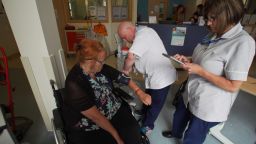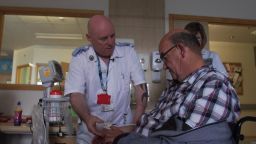Story highlights
John McElroy worked in a brick factory for 25 years
After suffering a stroke McElroy was left with speech, balance, and coordination issues and eventually lost his job
A chance conversation with a nurse rekindled his childhood dream of working in medicine
Registered nurse John McElroy is living his dream — one made of hospital scrubs, overnight shifts and patients facing difficult recoveries.
This husband and father of three works in a rehabilitation ward at St. Helens and Knowsley Teaching Hospital in St. Helens, England.
“When I was younger I always wanted to be a nurse,” he tells CNN.
Yet, McElroy’s journey into medicine was unusual — it didn’t begin until his 44th birthday.
“I worked in a local brick factory for about twenty-five years,” he recalls.
It was a physically demanding job,” he says. “Life in the factory was quite tough.”
It was about to get a lot tougher.
Not just a headache
In March of 2007, McElroy suffered what he thought was a mild headache.
He was out for drinks with friends at a local pub when a dizzy spell hit. He stumbled home, fell asleep and woke the next morning with even worse dizziness.
“The world was spinning like 500 miles an hour,” he recalls. “It was as if something inside my head had just exploded.”
McElroy’s daughter and wife called an ambulance and rushed him to the hospital. After five days of testing, scans revealed the problem — a stroke.
He lost sight in his right eye and words persistently failed him.
“I was speaking but the words — it was just jibberish. That was scary,” he says.
But the worst part, McElroy recalls, was the short temper he suddenly possessed. Doctors had warned that his stroke could cause personality changes. His wife was often on the receiving end of the new “heightened agitation.”
“I knew that I was different and it was like, ‘Why am I behaving like this?’ ” he explains.
His wife’s support during the darkest moments following the stroke played a vital role in his recovery and further deepened the couple’s love, he says.
“Without my wife’s support, I probably would have gone into a downward spiral.”
With lingering dizziness, balance and coordination issues, McElroy soon lost his job. His confidence was shattered.
“Although my wife was working we were struggling financially,” he says. “I was thinking I’m not ready for the scrapheap. I am too young.”
A conversation with destiny

When McElroy hit “rock bottom,” a chance meeting with a nurse during a hospital visit rekindled his childhood dream of working in medicine, he says.
“She said, ‘You would make a fantastic nurse,’ ” he said.
The nurse gave him a piece of advice he would forever remember.
“(She said) you will have loads of excuses to not do this, to fail, to quit. But you’ve got to carry on.”
A new start
Motivated by the nurse’s advice, McElroy began taking steps to begin a medical career. He enrolled in a local college, but soon discovered that learning while recovering from a brain injury would not be easy.
“I can’t tell you how many times I sort of wanted to stop. I said, ‘I just can’t do this,’ ” he recalls.

Despite the odds, and with the support of friends and family, McElroy didn’t give up.
After successfully completing his prerequisite courses, the former brick maker was accepted into a fast-track nursing program at a university. There he found out he had a learning disability called acquired dyslexia.
At the university, he received help from a learning facilitator who served as his “memory bank” by coaching him through assignments, McElroy said.
McElroy was awarded about $4,000 in scholarship money to complete his studies. In 2012 he achieved his childhood dream, graduating with his nursing degree.
Where hope meets medicine
Today, McElroy works alongside two nurses who once cared for him. Most of his patients have brain or spinal problems.
McElroy often uses his story to encourage patients like John Hargreaves.
Join the conversation
“He’s a good listener,” Hargreaves says. “He tells what happened to him and It inspires me to work harder.”
Each day McElroy sees pieces of his own journey reflected in his patients. He educates families on the unique needs of stoke survivors.
He hopes by sharing his personal story, his patients will believe that there is life after recovery.
“I hope people can know that it’s not the end of the world,” he says. “There is light at the end of the tunnel.”



